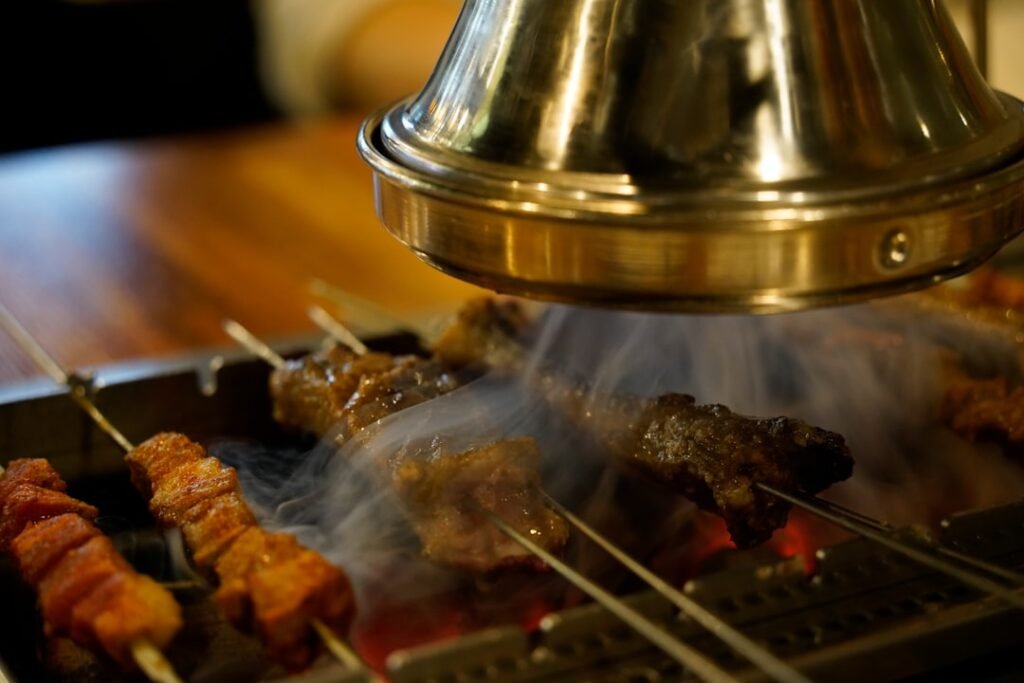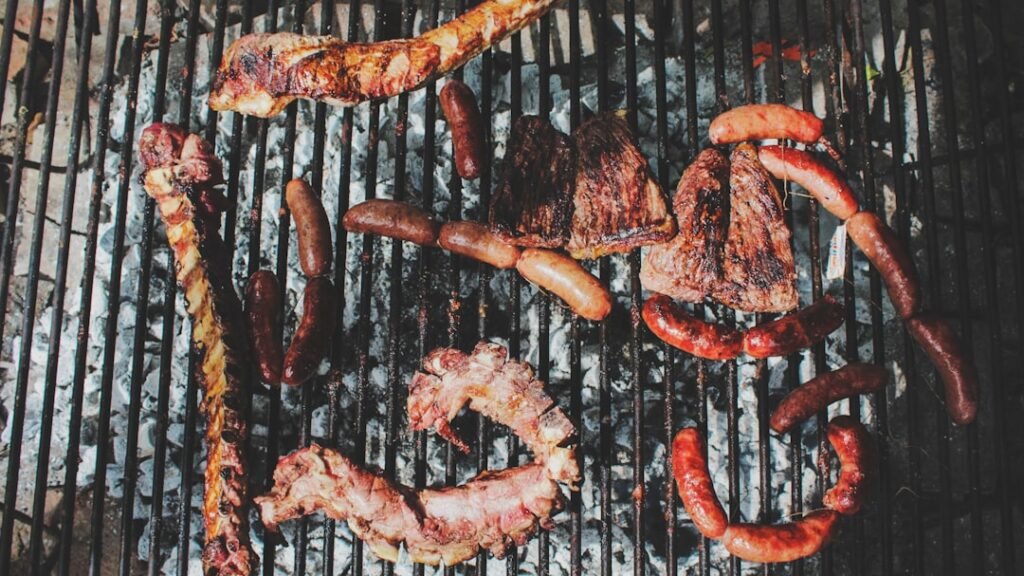Master the Art of BBQ Sauce: Tips for Perfecting Your Grilling Game

When I think about BBQ sauce, I am reminded of the rich tapestry of flavors that can transform a simple piece of meat into a culinary masterpiece. At its core, BBQ sauce is a condiment that enhances the flavor of grilled or smoked meats, but it is so much more than just a topping. The origins of BBQ sauce can be traced back to various cultures, each contributing unique ingredients and techniques that have evolved over time.
From the tangy vinegar-based sauces of the Carolinas to the thick, sweet tomato-based varieties found in Kansas City, the diversity of BBQ sauces reflects regional preferences and traditions. The basic components of BBQ sauce typically include a base, which can be tomato, vinegar, or mustard, along with sweeteners like sugar or honey, and various spices and seasonings. Understanding these foundational elements is crucial for anyone looking to create their own signature sauce.
The interplay between these ingredients creates a complex flavor profile that can elevate any grilled dish. As I delve deeper into the world of BBQ sauces, I find that mastering the basics allows me to experiment and innovate, leading to exciting new flavor combinations.
Choosing the Right Ingredients for Your BBQ Sauce
Selecting the right ingredients is essential for crafting a BBQ sauce that resonates with my personal taste preferences. I often start with a base, and my choice usually depends on the type of meat I plan to grill. For instance, if I’m preparing pork ribs, I might lean towards a tomato-based sauce that complements the richness of the meat.
On the other hand, when grilling chicken, I may opt for a vinegar-based sauce that adds a zesty kick. The versatility of BBQ sauce means that I can tailor my ingredients to suit different occasions and flavor profiles. Sweeteners play a pivotal role in balancing the acidity and spiciness of my sauce.
I enjoy experimenting with various sweeteners, from classic brown sugar to more unconventional options like maple syrup or agave nectar. Each sweetener brings its own unique flavor and texture, allowing me to create a sauce that is distinctly my own. Additionally, I pay close attention to spices and seasonings, as they can elevate my BBQ sauce from ordinary to extraordinary.
Whether it’s smoked paprika for depth or cayenne pepper for heat, the right combination of ingredients can make all the difference in achieving that perfect balance.
Balancing Sweet, Tangy, and Spicy Flavors

Achieving harmony among sweet, tangy, and spicy flavors is an art form that I continually strive to master in my BBQ sauce creations. The sweetness often serves as a counterbalance to the acidity found in vinegar or tomatoes, while the heat from spices adds an exciting kick that keeps my taste buds engaged. I find that starting with a basic recipe allows me to experiment with these elements until I reach a flavor profile that feels just right.
One technique I employ is to taste my sauce at various stages of preparation. This allows me to adjust the sweetness or acidity as needed. If I find my sauce leaning too heavily on the sweet side, I might add a splash of vinegar or a squeeze of lemon juice to brighten it up.
Conversely, if it’s too tangy, a bit more sugar can help round out the flavors. This iterative process not only enhances my understanding of flavor balance but also makes each batch of BBQ sauce uniquely tailored to my palate.
Tips for Applying BBQ Sauce to Your Grilled Meats
| Grilled Meat | BBQ Sauce Application | Result |
|---|---|---|
| Chicken | Brush sauce on during last 5-10 minutes of grilling | Tender and flavorful |
| Ribs | Apply sauce in layers during last 30 minutes of grilling | Sticky and delicious |
| Steak | Marinate in sauce for 1-2 hours before grilling | Rich and savory |
Applying BBQ sauce to grilled meats is an essential step in achieving that mouthwatering finish that I crave. Timing is everything when it comes to slathering on the sauce; I’ve learned that applying it too early can lead to burnt sugars and an unpleasant texture. Instead, I prefer to wait until the last few minutes of cooking before brushing on my sauce.
This allows the flavors to meld without compromising the integrity of the meat. I also find that using a basting brush helps me achieve an even application of sauce across the surface of my grilled meats. This technique not only ensures that every bite is flavorful but also creates an appealing glaze that enhances presentation.
Additionally, I often reserve some of my BBQ sauce for serving at the table, allowing guests to add more if they desire. This not only adds an interactive element to the meal but also ensures that everyone can customize their experience according to their taste preferences.
Experimenting with Different BBQ Sauce Variations
One of the most exciting aspects of making BBQ sauce is the opportunity for experimentation. With countless variations available, I often find myself inspired by different regional styles or personal preferences. For instance, I might try incorporating fruit purees like peach or pineapple into my sauce for a sweet and tangy twist.
These fruity additions not only enhance flavor but also add a unique texture that sets my sauce apart from traditional recipes. I also enjoy exploring international influences in my BBQ sauces. For example, adding soy sauce and ginger can create an Asian-inspired glaze that pairs beautifully with grilled chicken or shrimp.
Similarly, infusing my sauce with chipotle peppers can introduce a smoky heat reminiscent of Mexican cuisine. By experimenting with diverse ingredients and techniques, I continually discover new flavor profiles that excite my palate and keep my grilling adventures fresh.
Enhancing Your BBQ Sauce with Secret Ingredients

As I refine my BBQ sauce recipes, I’ve come to appreciate the impact of secret ingredients that can elevate my creations to new heights. These hidden gems often provide depth and complexity that might not be immediately apparent but make a significant difference in the overall flavor profile. For instance, adding Worcestershire sauce introduces umami notes that enhance the savory aspects of my sauce.
Another secret ingredient I’ve found success with is mustard—whether it’s yellow mustard for tanginess or Dijon for sophistication—this addition can brighten up the flavors and add an unexpected twist. Additionally, incorporating smoked salt or liquid smoke can impart a rich smokiness that mimics traditional barbecue methods without requiring hours spent over a grill or smoker. These secret ingredients allow me to personalize my BBQ sauce while keeping it intriguing and delicious.
Pairing BBQ Sauce with Different Types of Meats
Understanding how to pair BBQ sauce with various types of meats is crucial for maximizing flavor in my grilling endeavors. Each meat has its own unique characteristics that can be complemented by specific sauces. For example, when grilling beef brisket, I often opt for a robust tomato-based sauce with bold spices that can stand up to the rich flavors of the meat.
The combination creates a satisfying experience that highlights both the meat and the sauce. On the other hand, when I’m preparing lighter meats like chicken or fish, I tend to gravitate towards tangy vinegar-based sauces or citrus-infused glazes. These options enhance the natural flavors without overwhelming them, allowing for a harmonious balance on the plate.
By considering the inherent qualities of each type of meat, I can create pairings that elevate both components and result in a memorable dining experience.
Storing and Preserving Your Homemade BBQ Sauce
Once I’ve crafted my perfect BBQ sauce, proper storage becomes essential for maintaining its freshness and flavor over time. I typically transfer my homemade sauce into airtight containers or glass jars to prevent air exposure and contamination. This simple step helps preserve its vibrant flavors and prevents spoilage.
Refrigeration is key for extending the shelf life of my BBQ sauce; most homemade varieties can last for several weeks when stored properly in the fridge. However, if I want to keep it for an extended period, I consider freezing portions in ice cube trays or freezer-safe bags. This method allows me to have ready-to-use portions on hand whenever I’m ready to fire up the grill again.
By taking these steps to store and preserve my homemade BBQ sauce, I ensure that each batch remains as delicious as the day it was made, ready to enhance my next grilling adventure.





